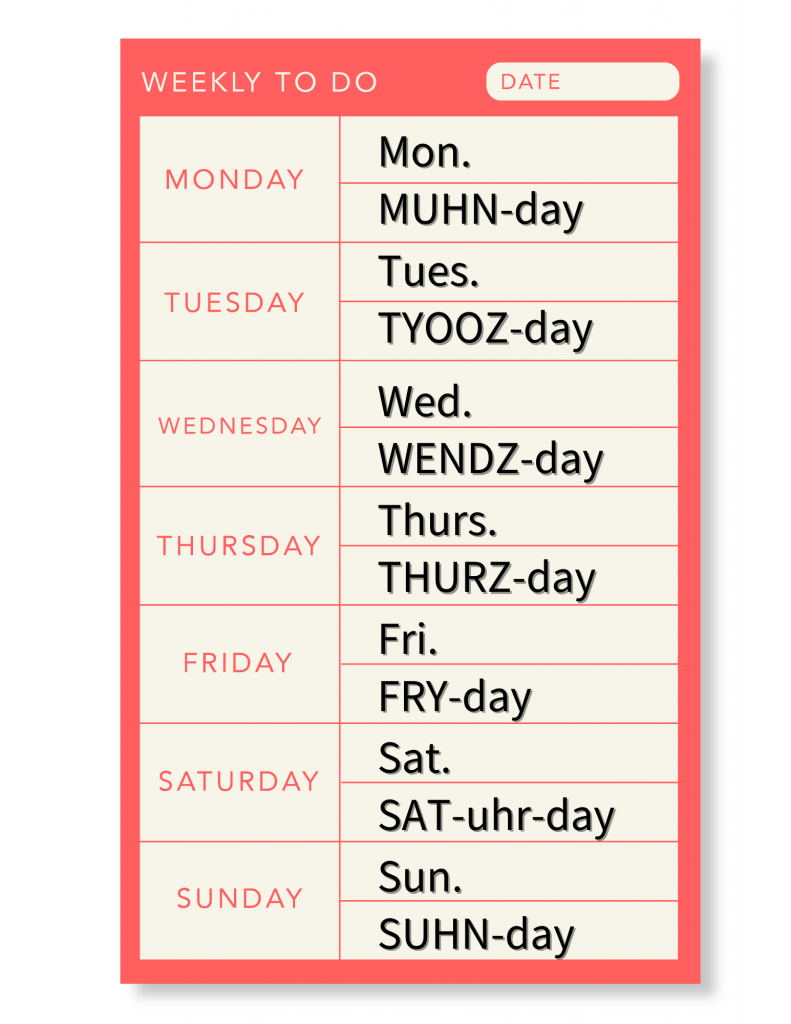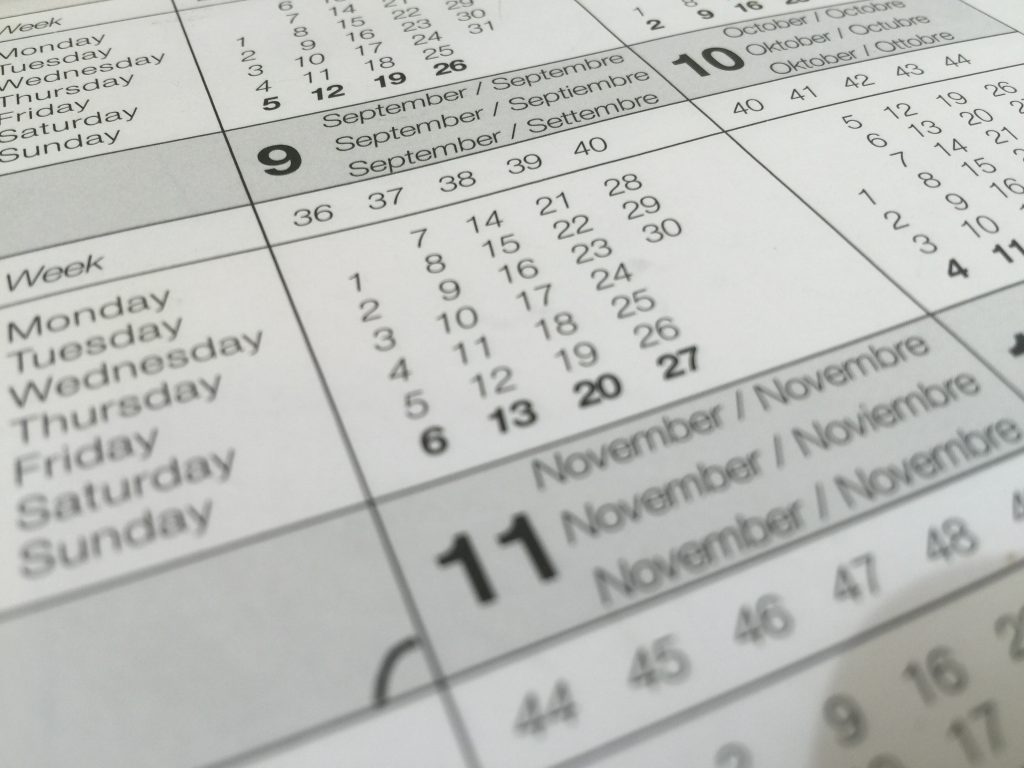Do you know the seven days of the week in English? If you’re trying to organize and communicate your plans confidently both socially and professionally you’ll need to know the days of the week in English.
Imagine trying to make plans with a new friend to practice your English. You arrive at the location at the right time, but your friend doesn’t show up. Realizing that You’ve come on a wrong day can really put a damper on your confidence.
In this article, we will be hashing out everything you need to know about days of the week in English as well as the idioms associated with them. By the end of this article, you will be confident in your days and move on to learning all months name in English.
Let’s not waste any time.


What are the 7 days of the week in English?
They are Monday, Tuesday, Wednesday, Thursday, Friday, Saturday and Sunday. Although native speakers have known the days of the week in English their whole lives, not many know their origin. Each week has seven days because ancient Babylonians thought there were seven planets in the sky, with each one controlling a different day of the week here on earth. So the days of the week are named after the sun, the moon, and a collection of Norse and Roman gods. This method of tracking time never went out of style, one which we still follow that same system today.
Below is an explanation outlining the origin of each day of the week, their short form, and phonetics as well as an audio clip for each day.
Monday
Origin: the first day of the week, Monday, is related to the moon. This was the day of the moon and is named after the Nordic mythical person ‘Maní’.
Short form: Mon.
Phonetics: MUHN-day
Tuesday
Origin: Mars is a god of war, also known as the Nordic god Týr . He is primarily known as the god of justice and war but is also described as wise and brave. It is Týr who has given his name to Tuesday.
Short form: Tues.
Phonetics: TYOOZ-day
Wednesday
Origin: Named after the Roman god Mercury, Odin is the most prominent god in traditional Norse mythology. He is particularly associated with war luck, royal power, rune power, and wisdom. Odin is called All-father because he is the father of all the gods.
Short form: Wed.
Phonetics: WENDZ-day
Thursday
Origin: Thursday originated from the Nordic god Thor. The name Thor is related to the word ‘thunder’. Thor is reminiscent of Jupiter, as they both deal with lightning and thunder. He controlled the weather and fought the enemies of civilization, who at that time were giants and trolls. He is associated with strength, aggression and reliability.
Short form: Thurs.
Phonetics: THURZ-day
Friday
Origin: The goddess Freya gave the name to Friday. Ruled by the planet Venus who is the goddess of love. She was perceived as the goddess of marriage. She was also a protector and helper in traditional women’s work, such as weaving, sewing and cooking.
Short form: Fri.
Phonetics: FRY-day
Saturday
Origin: the origin of this name is more inexplicable than the others. In the Old Norse days this name was laugardagr. ‘Laug’ means bath or hot water and ‘dagr’ means day. So you can translate the Nordic word for Saturday into ‘the day of the hot water’ or ‘bathing day’. Although in Latin this day was named after Saturn, which we can recognize as the English word for Saturday.
Short form: Sat.
Phonetics: SAT-uhr-day
Sunday
Origin: named after the Norse goddess Sól. ‘Sol’ means Sun. the day of the sun, over time, became Sunday.
Short form: Sun.
Phonetics: SUHN-day
| Day | Short form | Phonetics |
|---|---|---|
| Monday | Mon. | MUHN-day |
| Tuesday | Tues. | TYOOZ-day |
| Wednesday | Wed. | WENDZ-day |
| Thursday | Thurs. | THURZ-day |
| Friday | Fri. | FRY-day |
| Saturday | Sat. | SAT-uhr-day |
| Sunday | Sun. | SUHN-day |
Days of the Week in English Idioms and Slangs
Every language, like English, has its unique collection of sayings and phrases. These expressions, known as idioms, often contain meanings that may not be obvious by simply looking at the individual words. The time in English is no different.
Below are some examples of popular idioms for the days of the week in English as well as a brief explanation of these terms.
TGIF
TGIF is an abbreviation for `Thank God it’s Friday.’ It is used to express the joy one feels in knowing that the work week has officially ended and that they have two days off with which to enjoy.
Example: “TGIF! I don’t want to think about work again until Monday morning.”
Monday Blues
This idiom describes a set of negative emotions that many people get at the beginning of the workweek if they’re not happy at work. The noun ‘blues’ refers to a ‘sad’ feeling. This could be due to anything -laziness, no interest etc. It has nothing to do with the color ‘blue’.
Example: “I’m sad the weekend is over, I think I have the Monday blues.”
Giving Tuesday
Giving Tuesday started as a day for anyone, anywhere to give. It is often described as a global day of giving or a global generosity movement. In America, it is held each year on the Tuesday following Thanksgiving.
Example: “We’re counting on you beyond Giving Tuesday”
Throwback Thursday
If you’ve ever seen #TBT or “Throwback Thursday” before and not sure what it meant it can be described as a social-media trend when users, on Thursdays, post photographs or recollections of the past.
Example: “Throwback Thursday to the best time in Paris.”
Friday 13
Friday the 13th refers to a calendar date superstitiously associated with bad luck and evil doings. It occurs on the 13th day of the month on a Friday, which happens at least once every year but can occur up to three times in the same year.
Example: “Of course I got in a car accident today, it’s Friday the 13th.”

Bloody Sunday
Originating from a day of violence in Dublin during the Irish War of Independence the expression derives from the personal and collective trauma of seeing forces of the state open fire on ordinary citizens. In modern times it can be denoted as the fragile feeling after a particularly daunting weekend.
Example: “If I don’t find a distraction to keep me occupied for bloody Sunday, I’ll go mad.”
List of Words for Days of the Week in English
| English | Meaning |
|---|---|
| weekday | -days of the week other than the weekend |
| weekend | -a time for leisure, refers to Saturday and Sunday |
| today | -the current day |
| tomorrow | -the day after the current day |
| yesterday | -the day before the current day |
| daily | -to describe happens every day |
| weekly | -to describe happens every a week |
| day off | -a day that you take a leave, don’t need to work |
| bank holiday | -a day when banks and normal businesses close |
FAQ for Days of the Week in English
Although in much of the rest of the world Sunday is considered the first day of the week, in most Western countries, Sunday is a day of rest and a part of the weekend. This can also vary by country. For example, the UK and US begin the week on Monday while Israel begins on Sunday.
The days including and between Monday and Friday are called weekdays. In most traditional jobs work would fall on these days while non-working days fall on Saturday and Sunday which is referred to as weekends as the working week is over.
The days of the week in English are considered proper nouns. As proper nouns go, days, months, and holidays are always capitalized. It doesn’t matter where the day of the week falls in a sentence, it should be capitalized whether it is in the middle or end of a sentence.
This rule is very simple. To create the plural form of the days of the week in English you just add an “s”, so “Tuesday” would become “Tuesdays”. no apostrophe is needed unless you love something that belongs to Monday (like Monday’s vibe). You love Mondays!
Frigg, the Norse goddess of fertility and love, is often perceived as the same deity as Freya. The English name Friday is derived from Old English and means “day of Frigg.” In most languages with Latin origins, like the English language, the day is named after the fertility goddess and planet Venus.
Originating from Jewish and Babylonian calendars, English-speaking countries follow a seven-day week. These seven days are broken into two parts. If we start our week on Monday, as many western English-speaking countries do, the weekdays refer to the five days that people traditionally go to work at offices. These are called weekdays. While Saturday and Sunday (weekends) are considered the days for rest and recreation.
According to the international standard ISO 8601, Monday is the first day of the week. However, in some areas of the world, Sunday is considered to be the start of the week. This is because of religious reasons. However, with the arrival of industrialization, people began measuring their days according to the five-day workweek, which begins on a Monday. So although there is no “true start” of the week it can be decided objectively.
Learn English from Monday to Sunday!
Days of the week in English make up a vocabulary vital for precise expressions of our location in time. This sentiment can be applied to any language that you learn. For example, if you are planning on conversing in Japanese, learning the days of the week in Japanese will be vital to your success.
Likewise for other languages that don’t follow English norms. For example, the days of the week in Spanish are all in masculine form and are not capitalized, the same applies to the weeks in french.
Learning the days of the week in English doesn’t have to be hard and the results are massive. You can learn the seven days of the week through songs, games, and real-life practice through tutors. AmazingTalker has over 7 000 tutors ready to help every day of the week. More than 2 million students would agree.

















